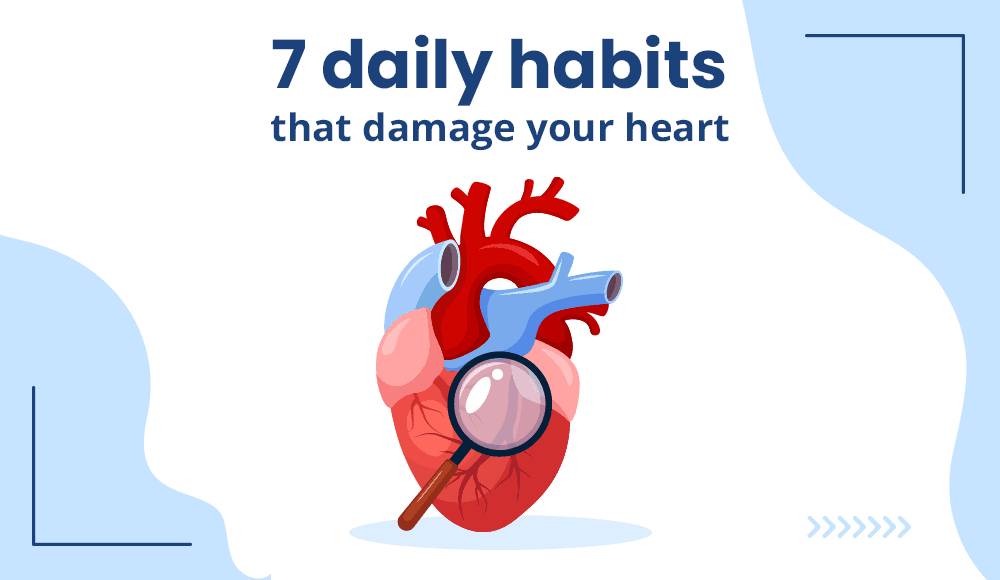7 Surprising Lifestyle Habits That Harm Your Heart
Your heart is a vital organ that tirelessly pumps blood throughout your body, keeping you alive and well. While many people are aware that habits like smoking or eating unhealthy foods can harm the heart, there are other, less obvious behaviors that can also pose significant risks. Let's explore seven surprising lifestyle habits that may be damaging your heart health.
1. Sitting for Prolonged Periods
In today's digital age, many of us spend hours sitting—whether it's at a desk job, watching TV, or browsing on our devices. Extended periods of inactivity can lead to poor circulation, increased blood pressure, and a higher risk of heart disease. In fact, a sedentary lifestyle is linked to an increased likelihood of developing heart disease, even for individuals without other risk factors.
What You Can Do:
- Take Regular Breaks: Stand up and move around every hour.
- Incorporate Physical Activity: Aim for at least 150 minutes of moderate-intensity exercise per week.
2. Consuming Excessive Processed Sugars
A diet high in processed sugars doesn't just affect your waistline; it can have serious implications for your heart. Excessive sugar intake is associated with obesity, inflammation, high blood pressure, and an increased risk of heart disease. Processed sugars contribute to the development of diabetes and chronic inflammatory conditions, both of which are detrimental to heart health.
What You Can Do:
- Read Labels: Be mindful of hidden sugars in packaged foods.
- Choose Natural Sweeteners: Opt for fruits or small amounts of honey instead of refined sugars.
3. Neglecting Oral Hygiene
It might surprise you, but your oral health is closely linked to your heart health. Poor dental hygiene can lead to gum disease, which increases the risk of heart infections and cardiovascular disease. Bacteria from inflamed gums can enter the bloodstream, causing inflammation in blood vessels and increasing heart disease risk.
What You Can Do:
- Brush and Floss Daily: Maintain a regular oral hygiene routine.
- Regular Dental Check-ups: Visit your dentist at least twice a year.
4. Chronic Stress and Poor Mental Health
Ongoing stress, anxiety, and depression can take a toll on your heart. These mental health issues can lead to increased heart rate and blood pressure, contributing to heart disease over time. The connection between heart disease and depression may be a two-way street, with each condition potentially exacerbating the other.
What You Can Do:
- Practice Relaxation Techniques: Engage in activities like meditation, yoga, or deep breathing exercises.
- Seek Support: Don't hesitate to consult a mental health professional if needed.
5. Excessive Alcohol Consumption
While moderate alcohol intake might have some health benefits, excessive drinking can lead to high blood pressure, heart failure, and even stroke. Alcohol can also contribute to weight gain, adding further strain to the heart. Over time, heavy drinking can weaken the heart muscle, leading to a condition known as cardiomyopathy.
What You Can Do:
- Limit Intake: Stick to recommended guidelines—up to one drink per day for women and two for men.
- Seek Help if Needed: If you find it challenging to control your drinking, consider seeking professional assistance.
6. Skipping Regular Health Check-ups
Avoiding the doctor can lead to undiagnosed conditions like high blood pressure or high cholesterol, both of which are significant risk factors for heart disease. Regular check-ups can help detect these issues early, allowing for timely intervention.
What You Can Do:
- Schedule Annual Exams: Keep up with regular health screenings.
- Monitor Your Health: Keep track of your blood pressure and cholesterol levels.
7. Inadequate Sleep
Not getting enough quality sleep can negatively impact your heart health. Sleep deprivation is linked to increased blood pressure, obesity, and diabetes, all of which elevate the risk of heart disease. Poor sleep patterns can disrupt the body's natural rhythms, leading to cardiovascular issues.
What You Can Do:
- Establish a Sleep Routine: Go to bed and wake up at the same time each day.
- Create a Restful Environment: Ensure your bedroom is conducive to sleep—dark, quiet, and cool.
Being aware of these surprising habits is the first step toward protecting your heart. By making conscious lifestyle changes, you can reduce your risk of heart disease and promote overall well-being. Remember, it's never too late to adopt heart-healthy habits.
Please follow for more.


